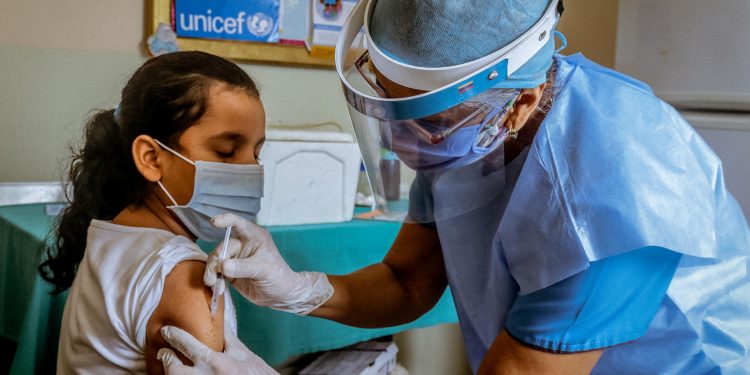The Pfizer COVID-19 vaccine has been recommended for authorization for kids between 5 and 11 years old, which might affect the current EA COVID-19 restrictions both in the Lower School and eventually the entire school as a whole.
According to The New York Times, an expert committee of the Food and Drug Administration (FDA) reviewed the vaccine for children in the 5-11 age group and advocated for authorization. Additionally, the Centers for Disease Control and Prevention (CDC) met on Tuesday, October 26 and Wednesday, October 27 to discuss the vaccine, but they have yet to recommend it to the public.

Photo Courtesy of eldiario.net
The vaccine is 90.7% effective as stated by The New York Times, but experts still doubt it’s effectiveness in children due to concerns about limited data. However, as reported by CNN, Moderna has said that kids were able to tolerate the vaccine and that it created a “robust immune response in children ages 6 to 11.”
The authorization of the vaccine for 5-11 year-olds could potentially transform the way EA currently organizes school. As of now, all three divisions of EA – the Lower, Middle, and Upper School – have the same restrictions because the students in the Lower School did not have the option of vaccination. Before the authorization, Sheila Garrity, the Lower School nurse, explained, “Because the age groups have different needs, we are working as a campus. Based on the Lower School’s needs of having to be socially distanced and masked, we are working with the entire campus under the same guidelines.”
Students have mixed opinions on the commonality of COVID restrictions between the Lower School and the Upper and Middle Schools. Alexa Cohen ‘23 comments, “I understand our restrictions because the Lower School students couldn’t get vaccinated. We had to make sure that those kids stayed safe. At the same time, I’m hopeful that with the new authorization, our school can get closer to a 100% vaccination rate, so we can lift restrictions and get closer to normalcy.”
On the other hand, Karen Xiao ‘22 believes that “because the FDA is expected to approve the new vaccine, I think we could start rolling back some of the lower school restrictions for Upper Schoolers. It’s best to take a more cautious approach, but given that EA’s had clinics for vaccines in the past, I think we can afford to change Upper School policies.”
Garrity is “hopeful” that the school will be safer once Lower School students start to get the vaccine, and some of the current COVID restrictions might be lifted. Many students share Garrity’s optimistic sentiment. Colin Schlitt ‘24 says, “I think that the availability of the vaccine for Lower School students is bringing us one step closer to a normal school year.”
Once enough Lower School students receive their vaccines, it is difficult to predict when restrictions will begin to be lifted. Garrity notes that EA policy could change only if the students get vaccination soon enough in the school year. She elaborates, “It takes a little while to get fully vaccinated; there’s the first dose and then you have to wait a certain number of days based on which one you get, and then another two weeks post your second vaccine until you are fully vaccinated. It is a lengthy process and not everybody will be on the same schedule, so at this point in time it is hard to project.”
The amount of students in the Lower School who get vaccinated is also a factor. Garrity realizes that because the targeted age group is younger, parents might be more hesitant to get their children vaccinated. She says, “I think that a lot of people will be reaching out to their pediatricians for guidance to answer a lot of those questions. Some will be running to the vaccine, and some will be waiting to see what happens to others. It really is going to be a personal decision.”
Pepper Clayor ‘23 shares her thoughts on the vaccine, saying, “I’m really excited because I want my parents to do whatever they need to do to keep my younger siblings safe. My sister is 7 and my brother is 5, and I would love for them to be able to go to school without masks and be safe.” Similarly, Christy Rheam, Upper School Science teacher, comments, “We will absolutely be getting it for our kids as soon as possible. Our pediatrician is a firm believer in vaccines, and so are we, so we’re going to be at the top of the list.”